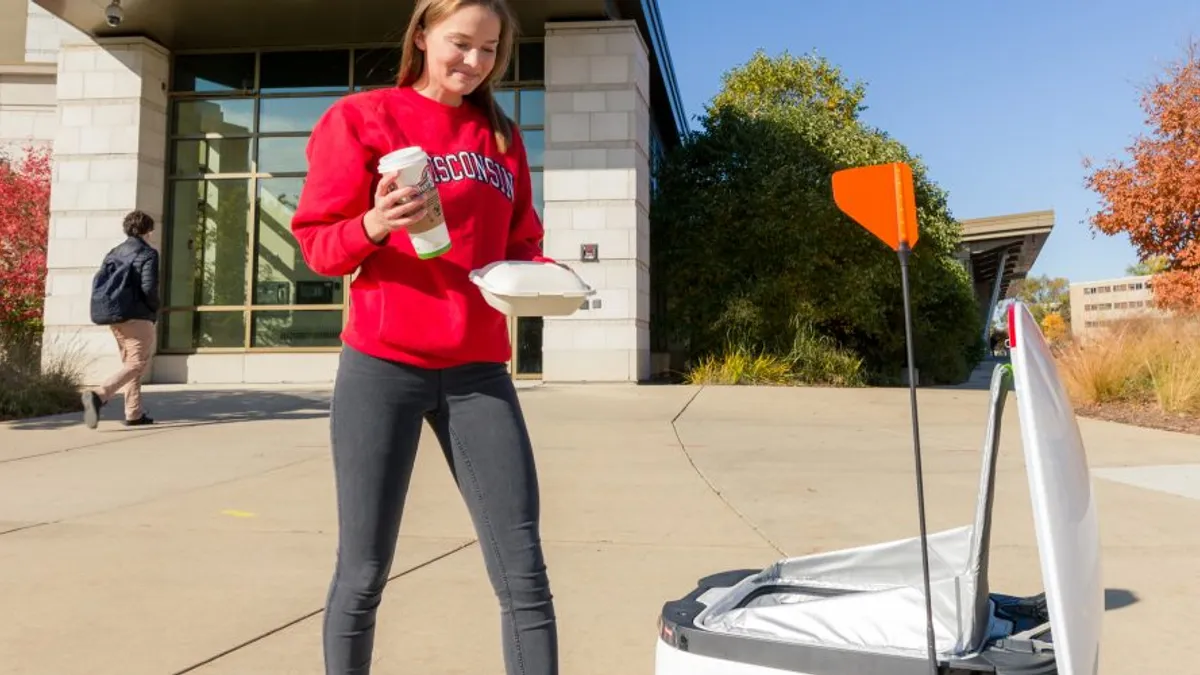Dive Brief:
- The University of Wisconsin–Madison is the latest institution where students, faculty and staff can have meals and snacks delivered by autonomous robots, one of the most recent tech trends sweeping campuses.
- The university announced this week that it has deployed 30 robots on campus. They were created by Starship Technologies and can deliver from three dining halls.
- Officials at Starship, which has pledged to expand to 100 campuses within two years, say that UW-Madison is the largest American university to use their services so far.
Dive Insight:
Starship rolled out its robots on college campuses earlier this year, starting with 25 at George Mason University. Students and employees could order Starbucks coffee, Dunkin' donuts and Blaze Pizza, along with groceries from Sodexo, a university vendor.
The robotics company has said its self-driving bots — small, boxy white vehicles that can carry up to 20 pounds — can generally reach their destination within minutes of being deployed, depending on what was ordered and how far it needs to travel.
Through a mobile app, users can place their order, indicate where they want it delivered, watch the bot's journey to that destination and unlock the container once it arrives.
Mobile food ordering has exploded in popularity on college campuses, with students turning to services such as Uber Eats and DoorDash to access off-campus restaurants. College officials, in turn, have attempted to offer students more convenient ways to order food from traditional campus dining venues.
Aramark, which offers dining services for at least 400 U.S. colleges, bought Good Uncle, an app-based food delivery service, earlier this year.
And GrubHub, another food-delivery service, last year acquired Tapingo, a company that catered its deliveries to college students.
UW-Madison touted the potential flexibility — and relative affordability — of the new service. Each delivery includes a $1.99 fee, the university said.
"Our students are juggling more than they ever have before, and we are always looking for inventive ways to support their campus dining needs," Peter Testory, director of dining and culinary services for UW-Madison's housing division, said in a statement.
Starship had raised more than $42 million from investors before announcing the agreement with George Mason. In August, the company said it had raked in a total of $85 million in funding and would reach at least 100 campuses within the next two years.
"An entire generation of university students are growing up in a world where they expect to receive a delivery from a robot after a few taps on their smartphone," said Starship CEO Lex Bayer in a press release in August.
The company also works with Northern Arizona University and Purdue University. Plans to offer them at the University of Pittsburgh have been postponed in response to accessibility concerns, the Pittsburgh Post-Gazette reported.
Similar roving robots from PepsiCo were introduced at the University of the Pacific, in California, earlier this year, hocking snacks and beverages.
And two Ohio universities, Ohio State University and Xavier University, installed pizza vending machines on their campuses.










